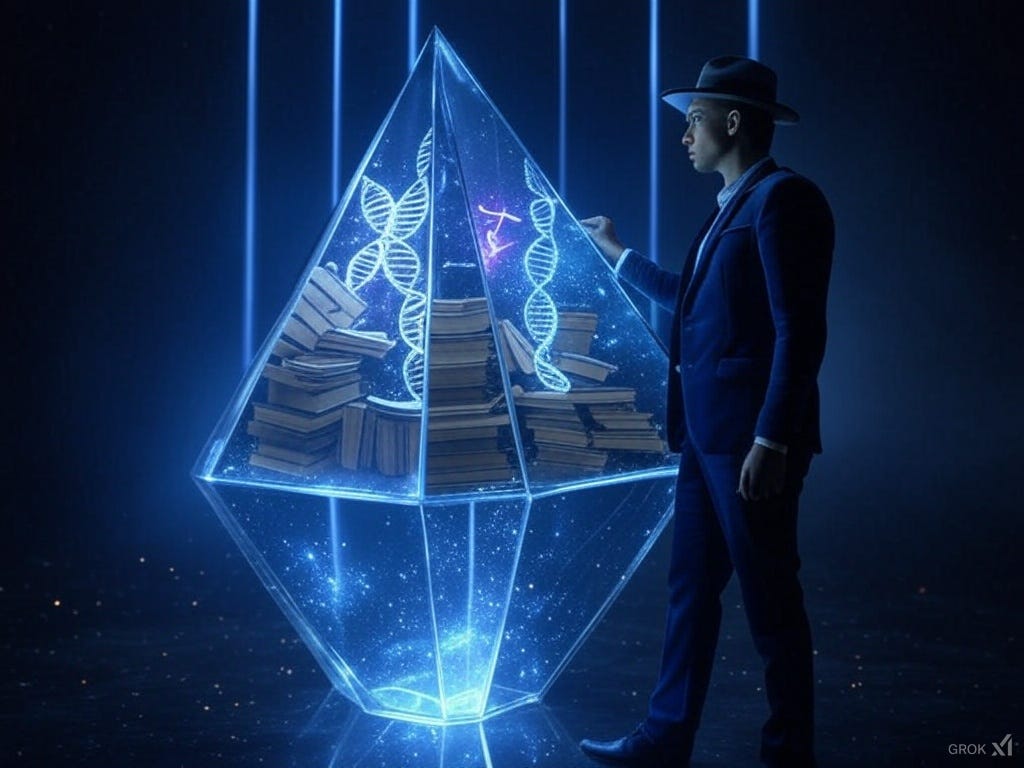01 - Wherefore curiosity?
Life without enquiry is not worth living - Socrates
So… where do we start? I began my introduction about this stream, or should I say about myself, with a point about curiosity. That we are born curious. Let’s look closer at this curious thing: curiosity, itself! Since that’s what is going to lead us to a great many things to be said and done here.
Why are we born curious? The answer I think is quite simple: our existence, our very survival depends on it!
The key evolutionary purpose, in my mind, of curiosity1, is to propel every member of a species to seek to understand reality - its environment, its needs, its very existence. Thus I posit that curiosity – and self-interest, more on that another time – are the very cornerstones of the existence and survival of an organism, and its species: if a creature was not curious, it wouldn’t seek to understand the reality around it, and would soon be taken over by another creature, perhaps of another species, which was and did.
So what are the tools we have at our behest to understand reality?
Fundamentally, it’s intelligence. In the context of my argument here, intelligence is what we - humans, but to different degrees, all species - have, in our quest to satisfy our innate curiosity and make sense of the world around us.
Intelligence is a very powerful tool. It allows us to recognize patterns in our perceived reality and process them to our needs. It allows us to visualize and predict potential actions by other actors in the environment and modify our own behavior accordingly. Intelligence is the very basis of life, and by extension many of the systems we build in life.
And, given intelligence, what are the means we have at our disposal to understand reality?
I would mention observation, reasoning and learning. We observe the world as it were. Why? Because we are curious. We reason about it. Why? Because we are curious why. And we learn from our observations and our reasoning.
And in all these, it’s our intelligence that enables us at each step along the way: it’s with observation that our intelligence can do its pattern-matching, which combined with reasoning enriches our ability to process reality, enhancing our mental model of reality - the learning.
And, using these tools and means, what are the props we have within our grasp to understand reality?
It’s information and knowledge. We obtain information by way of our observation, and our mental faculties such as reasoning allows us to process that information into knowledge.
Information is the raw sensory inputs we get, the environmental signals we receive, the patterns we observe. Knowledge we arrive at when we have made sense of these patterns, established models on the basis of inputs, derived insights from the signals.
You might say, well this is all obvious! Why am I telling you all this? I wasn’t born yesterday! True, but that’s not my point. Apart from laying out the intent of my project here, this also seeks to demonstrate my method: first-principles thinking.
At every stage, on every concept I seek to analyse and expound, here as in life, I shall strive to take a first-principles approach - get down right to the very core fundamentals of it, and build up from there. At the risk of sounding smug or snobbish, I present that this is not done sufficiently enough in popular discourse, which is one reason for much misunderstanding between people and conflict in society.
So all this is part of an epistemological framework I’m setting up here, as a foundation for how I seek to go about this journey, of exploring the world, of observing reality, of seeking knowledge - of trying to satiate my curiosity. And this epistemological framework I’m sharing with you here for I want you to join me in this journey, and this I hope gives you an idea of the approach we are going to take here.
In my aforementioned introduction, I mentioned a bunch of disciplines that have been the relentless objects of my insatiable curiosity:
the sciences and the arts; in technology and the humanities; in engineering and in history: etymology, epistemology, economics, business, finance, geopolitics, rhetoric, futurism; the sciences such as mathematics and physics alongside social sciences such as anthropology and psychology; philology and philosophy.
So yes, my, hopefully our, epistemological journey encompasses many if not all of these fields together, and perhaps more.
Not limited to a single field, this is thus a multi-faceted, polyontic, polymathic adventure. And for this reason, I present to you Polymathon. A publication stream specifically dedicated to this polymathic exploration. Indeed, I make a full case of why this is worth its own dedicated pursuit - over there.
And, what about here? My ‘main’ Substack publication? Here we will perhaps deal with more specific topics, of perhaps more direct and current relevance.
Watch this space too!


